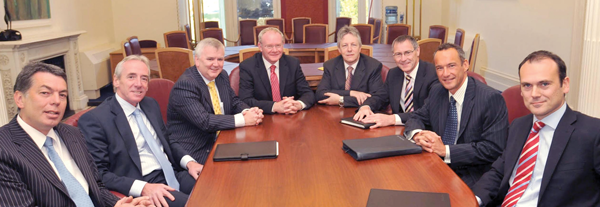Northern Ireland political views
agendaNi summarises local opinion and policy on banking following initial ministerial meetings in 2008.
Financial services policy is reserved to Westminster under the Northern Ireland Act 1998 and considerably influenced by decisions in Dublin and Brussels. The remit is effectively shared between George Osborne, Vince Cable and Lord Sassoon (the Treasury’s Commercial Secretary). The Ulster Bank and Bank of Ireland are headquartered in Dublin, First Trust is part of the (effectively nationalised) Allied Irish Banks, and the Northern Bank is a subsidiary of Danske Bank, based in Copenhagen.
Peter Robinson and Martin McGuinness first met the banks on 21 July 2008 (see above), to discuss how to deal with rising costs and ensuring mortgages for householders during the credit crunch.
Speaking afterwards, Robinson said that the Executive and various business sectors needed to do “all we can to alleviate uncertainty and hardship in the wider community as we approach the autumn and winter periods ahead.”
McGuinness said that local political leaders needed to “exercise what power we have to minimise the impact to communities living in poverty and aim to increase economic growth.” The Executive and Civil Service would “bring forward agreed actions” after a series of meetings with sectors.
The Executive was not meeting at the time and its support package was only finalised in December of that year.
When asked by David Ford on 13 October 2008 about OFMDFM’s discussions with the banks, Robinson replied that he and the deputy First Minister had been told that “there was a readiness and a willingness on [the banks’] part to lend money.”
Almost one year later, he voiced his anger because local banks had told him “that they have never lent more,” but were in fact holding back from lending to certain sectors, particularly development. Interest rates were too high, arrangement fees had increased and overdrafts were being “arbitrarily removed and reduced.”
In June 2011 Robinson told the Assembly that the role of the banks had been discussed in all recent British-Irish Council, Joint Ministerial Committee and North/South Ministerial Council meetings. Robinson and McGuinness also discussed their concern about Northern Ireland’s reliance on its four main banks, with the Chancellor. They had asked him to second one of his officials “to look at the peculiar banking circumstances of Northern Ireland.”
Martin McGuinness reported on 15 December 2010 that he and the First Minister had discussed their concern that the re-structuring of Irish-owned banks could result in lost trade and possible contraction of the finance sector with President of the European Commission, José Manuel Barroso, in Brussels.
The DUP’s local banking policy focuses on pursuing banks to provide working capital for growing local businesses. It would demand regular figures updating the levels of business lending in the province, according to its Assembly manifesto.
Locally, Sinn Féin would seek agreement from the four main banks to establish a sustainable economic development bond of £400 million from 2011 to 2015. A state bank (formed through the nationalisation and amalgamation of AIB and Bank of Ireland) is proposed in its Westminster and Dáil manifestos. In the Republic, it would also abolish the bank guarantee, ‘burn the bondholders’ and wind-down NAMA.
A ‘Robin Hood’ levy of 50p on every £1,000 of speculative transactions between banks is backed in the SDLP’s Westminster manifesto.
Alliance wants to increase the flow of credit to SMEs and see quick decisions on loan finance. It wants an independent credit review team to support businesses which feel that they have been treated unjustly by the sector.
The UUP’s banking policy is outlined in UCUNF’s 2010 Westminster manifesto. It agrees with reforming the regulation and structure of the banking system to ensure lower levels of leverage, less dependence on unstable wholesale funding, and greater availability of credit for SMEs. Retail banks would not be involved in property trading, the Bank of England would crack down on risky bonus arrangements and a ‘people’s bank bonus’ would give citizens the chance to buy a stake in the state-owned banks.






